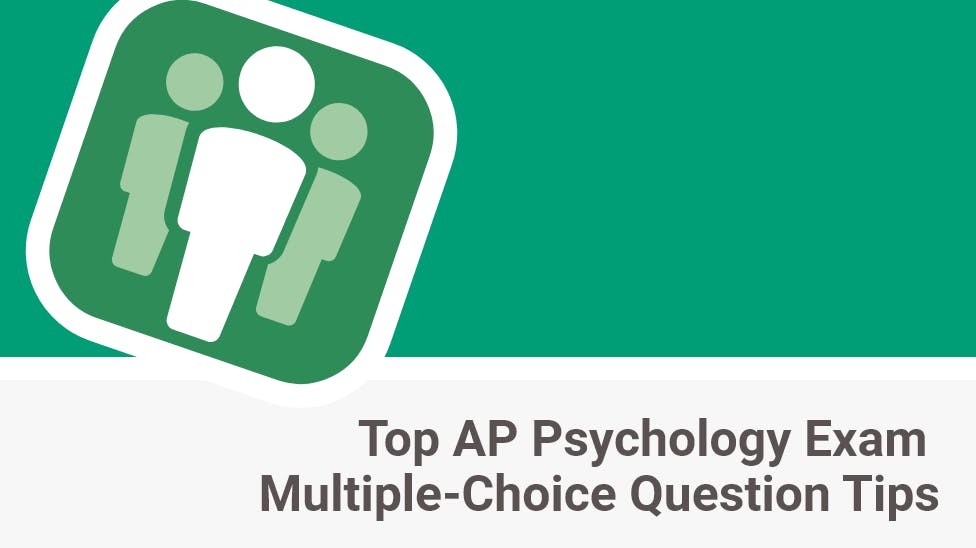Top AP Psychology Exam Multiple-Choice Question Tips
August 23, 2024

Two-thirds of your AP Psychology exam grade depends upon your performance on the multiple-choice questions. You will take the multiple-choice section of the test first. It is comprised of 75 questions, and you will be allotted 90 minutes to answer them.
This section of the test includes a mix of easier and more difficult multiple-choice questions. Therefore, don’t be alarmed if you have more trouble answering some of the questions: do your best and move on! If you have time after finishing all the questions, you can look back at the items you had trouble with and think about them a bit more. Below, we summarized a few AP Psychology tips to help you prepare for and tackle multiple-choice questions on the exam.
AP Psychology Multiple-Choice Study Tips
Apply some of what you’ve learned about psychology to how you study.
- It’s better to space out your studying over many days than to cram for the same amount of time right before the exam.
- Studying is important, but so is sleep. You’ll think better if you’re well rested. According to the Yerkes-Dodson law, a moderate level of arousal will help you perform well on the test. Although you do not want to be so anxious that you can’t focus, you will want to “psych” yourself up for the test.
- In cognitive psychology research, retrieval practice is one of the most effective study methods. Made sure you quiz yourself after you study content. In addition, you can use the “blank paper” technique: after you read about a group of concepts, close the book, get out a blank sheet of paper and write down everything you can remember. This technique helps you realize what you actually learned from the reading and what you need to review.
AP Psychology Exam Multiple-Choice Question Tips
Review our expert tips for answering multiple-choice questions on the AP Psychology exam.
Multiple-Choice Question Tip #1: Narrow down the possible answers.
Sometimes the questions on the exam are more difficult than the examples above and you will not be able to identify the correct answer before reading the answer choices. That is the beauty of the multiple-choice format: even if you are not sure you completely understand the concept in the question, you should be able to narrow down the possible answers by using what you do know about psychology. As mentioned above, you should always carefully read each of the answer choices. When you decide a choice is incorrect, cross it out, and eliminate it from consideration. You will be able to use this method often to identify the correct answer.
Multiple-Choice Question Tip #2: Answer every question to maximize your score.
Some tests include a “guessing penalty” to discourage students from guessing on multiple-choice questions. (Past versions of the AP Psychology exam included a guessing penalty.) However, there is no guessing penalty on the current AP Psychology exam. The score for the multiple-choice section is based on the number of questions answered correctly, and no points are deducted for questions answered incorrectly or left blank. Since there is no penalty for guessing on the exam, you should answer each of the multiple-choice questions, even if you feel like you are guessing.
Multiple-Choice Question Tip #3: Guess smart.
When you are not sure of the answer to a question and, therefore, are trying to eliminate incorrect choices, here are a few other tips about how to make good guesses on AP Psychology multiple-choice questions.
- Use your common sense. Don’t get so caught up thinking about what you learned that you forget to think clearly about the question.
- Use your knowledge of the psychological perspectives. Sometimes language used in the stem of the question can give you a clue about the right answer. Each psychological perspective uses its own vocabulary terms, and the correct answer choice will frequently use language specific to the perspective indicated by the stem of the question.
- Avoid extreme answer choices. Choices that contain words like all or never or everyone are not likely to be correct. Multiple-choice items on the AP Psychology exam are very carefully written, so you are not likely to encounter many items that include these extreme answer choices.
- Be wary of answer choices that are very similar to one another. Remember that you are looking for the best answer. If some of the answers are so similar that one cannot be better than the other, neither of those choices can be the correct answer.
AP Biology Resources
- About the AP Biology Exam
- Top AP Biology Exam Strategies
- Top 5 Study Topics and Tips for the AP Biology Exam
- AP Biology Short Free-Response Questions
- AP Biology Long Free-Response Questions
AP Psychology Resources
- What’s Tested on the AP Psychology Exam?
- Top 5 Study Tips for the AP Psychology Exam
- AP Psychology Key Terms
- Top AP Psychology Exam Multiple-Choice Question Tips
- Top AP Psychology Exam Free Response Questions Tips
- AP Psychology Sample Free Response Question
AP English Language and Composition Resources
- What’s Tested on the AP English Language and Composition Exam?
- Top 5 Tips for the AP English Language and Composition Exam
- Top Reading Techniques for the AP English Language and Composition Exam
- How to Answer the AP English Language and Composition Essay Questions
- AP English Language and Composition Exam Sample Essay Questions
- AP English Language and Composition Exam Multiple-Choice Questions
